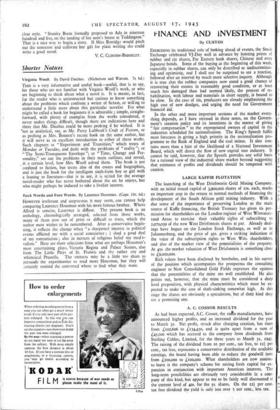Shorter Notices THIS is a very informative and useful book—useful,
that is to say, for those who are not familiar with Virginia Woolf's work, or who are beginning to think about what a novel is. It is meant, in fact, for the reader who is uninstructed but curious to know something about the problems which confront a writer of fiction, or willing to understand a little more about this particular novelist. For what might be called a book for beginners it is admirable ; simple, straight- forward, with plenty of examples from the works considered, it never makes things difficult, though there are indications here and there that Mr. Daiches could be more probing if he wished. It is not as analytical, say, as Mr. Percy Lubbock's Craft of Fiction, or as probing as Mrs. Bennett's recent book on the same author, but it will serve as an excellent introduction to either of these works. Such chapters as " Experiment and Transition," which treats of Monday or Tuesday, and deals with the problems of " reality "; or " The Semi-Transparent Envelope "; or " Time, Change and Per- sonality," set out the problems in their main outlines, and reveal, at .a certain level, how Mrs. Woolf solved them. The book is not confined to fiction, but treats also of the essays and biographies, and is just the book for the intelligent sixth-form boy or girl with a leaning to literature—that is to say, it is suited for the average novel-reader who has never bothered about the art he enjoys, but who might perhaps be induced to take a livelier interest.


























 Previous page
Previous page